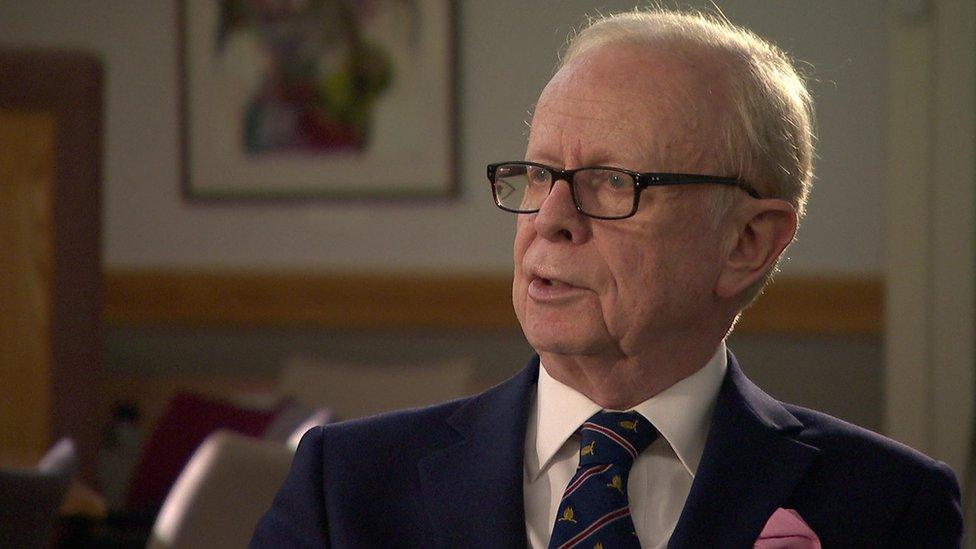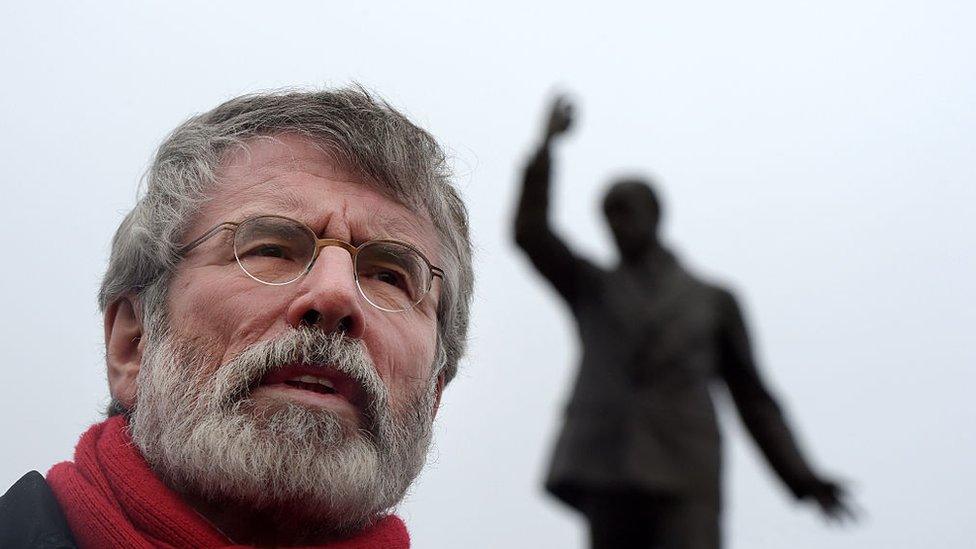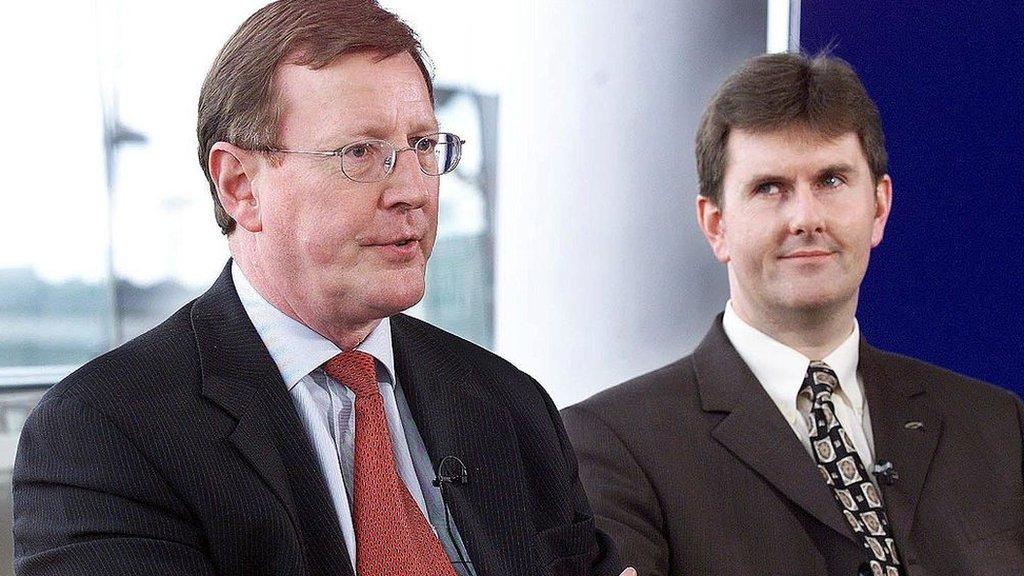Good Friday Agreement: Saving lives more important than votes - Empey
- Published

Lord Empey says the agreement saved lives, and that was more important than votes for a political party
Former Ulster Unionist Party (UUP) leader Lord Empey has said even though the Good Friday Agreement split his party, he does not regret supporting the deal.
Lord Empey told BBC News NI it saved lives, and that was more important than votes for a political party.
The historic agreement in 1998 brought an end to 30 years of conflict known as the Troubles.
The UUP was led at the time by Lord Empey's friend David Trimble.
Lord Trimble won the Nobel Peace Prize in 1998 along with John Hume, then leader of the Social Democratic and Labour Party.
Both men have since died.
At the time, the UUP had 10 MPs at Westminster, now it has none.
It was the biggest party in Northern Ireland, now it is the fourth-largest in the assembly.

Lord Empey, along with David Trimble, was one of the main negotiators for the UUP
Lord Empey was one of the main negotiators for the UUP, often leading the delegation at Stormont when David Trimble and other MPs were at Westminster.
Asked if the decline in the UUP was a price worth paying for the agreement, he said: "If you are alive and well in Northern Ireland today then I suppose the answer to that is 'yes'.
"We have suffered politically because it was so difficult.
"But what's the point of being in politics if you can't do things and can't bring about change?
"Yes, we could have walked out, beating our chests 25 years ago and said 'we're the tough people and we can do this, and we can do that', but where would the place have been if the violence had reignited?
"I think we have saved a lot of lives.
"We have prevented a lot of people being injured and we have prevented the economic destruction of our province.
"Have we got it all right? No."
Lord Empey spoke to BBC News NI in the room in Castle Buildings on the Stormont estate where the agreement was negotiated 25 years ago.

Need more information of what the agreement was?

Unionists opposed to the deal objected to a clause which allowed IRA and loyalist paramilitary prisoners out of jail within two years.
They also criticised moves to reform policing and they wanted a clear provision that Sinn Féin would be prevented from holding ministerial positions until the IRA decommissioned its weapons.
Lord Empey accepted these issues were extremely difficult for unionists, but he felt the agreement improved the quality of life in Northern Ireland and secured its place within the United Kingdom.
The UUP backed the deal on Good Friday in 1998 even though some of the party's negotiating team, including Jeffrey Donaldson, walked out of the talks at the last minute.
The pressure on the party - and David Trimble - steadily increased in the final 24 hours of the negotiations.

Jeffrey Donaldson (front left) refused to sign up to the agreement and left the talks at the last minute
Lord Empey remembers the "strain".
"We actually sent David [Trimble] down to the Stormont Hotel to try to get some rest, because we could see the pressure was building up from all places.
"Huge pressure from within our own party… pressure from other parties, pressure from the USA, pressure from Tony Blair."
Late in the afternoon of Good Friday, after a meeting of senior party figures, a decision was made.
David Trimble addressed his negotiating team at Castle Buildings and told them he was going upstairs to another room to inform the chairperson of the talks, US Senator George Mitchell, that he was prepared to support the agreement.
"David stood up either on a chair or a desk so that he could be seen in the room… he said anybody who wished to join was welcome to do so," Lord Empey said.
"That was an act of real leadership. I'll never forget it."
Any regrets?
"My only regret is that it was unfortunate that all of unionism didn't stay in [the negotiations] because if that had happened, we could have done even better, bearing in mind that roughly 45% of unionism was out of the room," he added.
Ian Paisley's Democratic Unionist Party (DUP) had left the talks the previous year, after Sinn Féin politicians were allowed to take part, following a ceasefire by the IRA in summer 1997.
Although the DUP was opposed to the Good Friday Agreement it agreed to take its seats in the Northern Ireland Assembly set up by the deal, as well as ministries in the new executive.
Within a decade, the DUP had overtaken the UUP as the largest unionist party.
Lord Empey took over the leadership of the party for five years when David Trimble stood down in 2005.
Since 2011 the 75-year-old has been in the House of Lords and remains active in politics.
He is dismissive of the idea that a united Ireland could happen in his lifetime.
"You cannot simply bolt together two pieces of land and say they're a nation," he said.
"That's not how it is."

Declan Harvey and Tara Mills explore the text of the Good Friday Agreement - the deal which heralded the end of the Troubles in Northern Ireland.
They look at what the Agreement actually said and hear from some of the people who helped get the deal across the line.
Click here to listen to the full box set on BBC Sounds.

TROUBLES AND PEACE: A story of history and hope - 25 years since the Good Friday Agreement was signed.
ENDGAME IN IRELAND: The inside story of the peace process in Northern Ireland.

- Published28 March 2023

- Published26 March 2023

- Published14 March 2023

- Published20 February 2023
